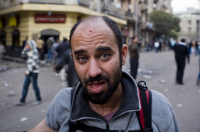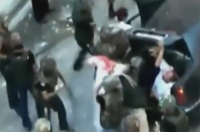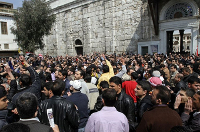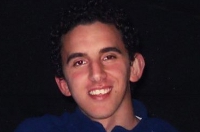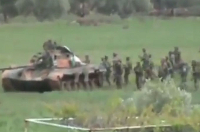Zymo Lotfi
Long-haired “metalhead” arrested and accused of spying after being spotted in a cafe with a suspect.

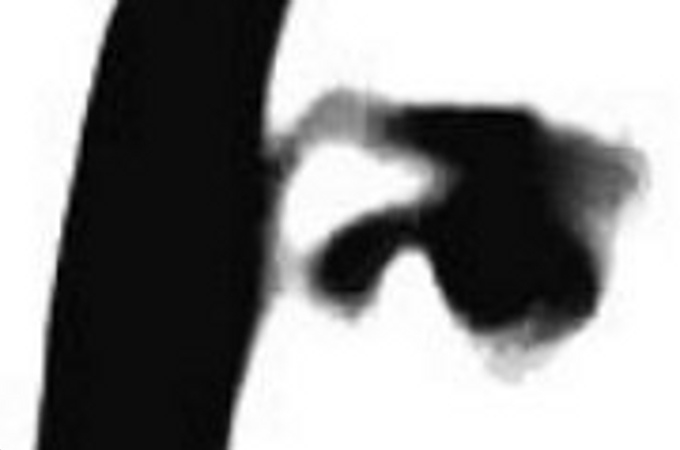 |
| An altered image Lotfi put on his Facebook page. He was sent to Damascus after asking for his ID card back [Facebook] |
Zymo Lotfi worked for a shipping company on Syria’s Mediterranean coast. Zymo is his nickname, but Lotfi is a pseudonym. Though he has escaped Syria, he still prefers not to make his real name public.
(Skip to the stories of others imprisoned in Syria.)
Lotfi, 29, is a fan of black metal. He wears his hair long, down to his shoulders. Immortal Empire and Gorgoroth are among his favourite bands. When the uprising broke out, he was working on his own one-man project, playing drums and guitar and recording himself on his computer.
Like most of his friends, Lotfi hates the Assad regime. But he held back from participating in protests because he lacks Syrian citizenship; his father comes from another country that he asked not be named. He did not want to be arrested and painted as a foreign spy.
Lotfi met Muhammad Radwan through a friend a week before Radwan was arrested at the Umayyad Mosque protest, in late March. He and Radwan had been among a group of men who had met for tea and coffee at a local cafe in Lotfi’s town.
Lotfi remembered seeing Radwan’s image on Al Jazeera Arabic after his arrest. He knew that meant he was a target as well. He assumed there had been a security agent or informant in the cafe.
Lotfi stayed at home for five or six days, hoping to avoid the dragnet. Eventually, he ventured out. At a cafe, a man approached.
“We want to have a small chat with you, just five minutes,” he said. He ushered Lotfi outside, then handcuffed him and put him in a car.
‘Sign on a blank paper’
He took Lotfi to the Political Security building in town. Lotfi saw a sign that indicated he was being taken to the “Parties Department”.
“We’re not trying to harm anyone, you have to tell us where you were last Thursday,” his interrogator said.
Lotfi mentioned the cafe.
“People saw you there,” the man said. “Have you been with someone who you didn’t really know?”
He knew Radwan’s name and the name of the mutual friend who had introduced Lotfi.
Radwan is a spy, the man said. He works for the Americans, he’s been in Israel and he’s planning to give photos of Syria to the enemy. For the sake of your family, he said, tell us what really happened.
“And by saying, ‘Tell us what really happened,’ they meant I have to confess whatever they tell me and sign a blank [piece of] paper,” Lotfi said.
Eventually, his interrogator produced a paper. They wanted him to write his confession, identifying Radwan as a spy. Lotfi refused, he wrote only that he had met Radwan.
He was held in the Political Security building for four days before being released, but the officers kept his identification card. Lotfi waited for a month, then decided to ask if he could have it back. Surprisingly, they returned it without a fight. But within a few hours, a state security officer was at Lotfi’s door.
This time, the “real investigating” began.
To the Damascus underground
They took him into custody and told him to confess that he had received money from abroad and helped run a Facebook page encouraging the uprising.
The questioning lasted for two days. When Lotfi refused to give in, the man told him he could be sent to Damascus. Lotfi knew that meant torture, but he thought it was an empty threat. He was wrong. Within hours, he found himself blindfolded and handcuffed, on a bus to the capital.
When he arrived, they pulled him out by his hair and slapped him. They brought him into a reception room and emptied his pockets, then kicked him down a flight of stairs to the underground cells.
They pulled him in to a room by his hair, stripped him naked and beat him with cables and bare fists. They doused him with cold water and put tight metal clips on his nipples until they bled.
After the beating, they led him down a hall. The ground was concrete, the ceiling lit by white neon. There were no windows. On either side were at least 16 cells with iron doors.
Lotfi was put in a cell by himself, blindfolded and naked, his feet bare on the cold floor. His clothes lay in a pile in a corner, but he was told not to put them on. Guards periodically looked through a small window in the door to check that he was not sleeping.
Later, two prisoners came in. He whispered to one, asking where they were. The man, in a Damascene accent, said he didn’t know. A passing guard saw the man talking, entered the cell and beat him with a cable.
Facebook and gun-running
Every day in custody became a test. The food was hard to eat. On the first day, it was a “filthy, sugary jam”, Lotfi said, and if he and his cellmates did not eat it, the guards said they would be considered hunger strikers and punished.
Guards handed out random beatings to the prisoners when they left their cells for approved bathroom visits, making each an anguishing trip.
After three days, Lotfi and the other two were put in a mass cell that measured about 25 square metres. There were nearly 30 people inside, he said. Their handcuffs had been removed, and the men sat on the floor. The next day, nearly 40 people were added. When they arrived, they were naked, Lotfi said. The youngest prisoner was 14, the oldest 68.
With the increased numbers, everyone stood. Those who wanted to sleep would lean on someone nearby and lay their head on the other’s shoulder. Occasionally, guards came to pull a prisoner out, seemingly at random, and beat him.
Eventually, Lotfi was led up to a room on the ground floor for interrogation.
“He started to tell me, ‘Now look, what did you do with your Facebook page?’ I said, ‘No, I don’t have a Facebook page,’ and I know they are stupid enough to believe, or not to be able to know that I really have a Facebook page. So I said, ‘No, do you have any evidence?’ He said, ‘No, but we have this page, ‘The Syrian Revolution’.”
The interrogator told Lotfi they had evidence against him that could get him hanged.
“We have some clues that you’re running that page and we have evidence that you get money from abroad to buy guns and give them to the protesters to kill the security agents and the army soldiers,” the man said.
Lotfi began to make up a confession, but the man stopped him.
“No, you’re lying.”
“I’m Lebanese,” Lotfi said. “I don’t have anything to do with the Syrian revolution.”
“We’re going to check your computer,” the man said. “And we’re going to send it to the experts, and they’re going to check it and see if you have anything to do with Facebook.”
By chance, Lotfi had reformatted his laptop before being arrested, and his guards evidently did not know how to restore deleted files. Two hours later, he was sent back to his cell.
‘Go find girls, drink alcohol, smoke weed’
More days passed, and Lotfi began to lose hope. When he was arrested, his mother had been sick, and he worried about her and the rest of his family. Nobody knew where he was.
He engaged in whispered conversations with other inmates in the line for the bathroom. Several admitted they had been arrested while protesting, but most said they had been taken off the streets while going about their business, buying bread or milk.
At the end of his second week in custody, a jailer called Lotfi’s name. He was being released. In the reception room, some of his belongings were returned. His jacket and the money in his wallet were gone.
The man at the desk told him they could compensate him for the jacket. Lotfi said they could keep it.
“You seem like a nice guy, a good guy,” the man told Lotfi. “Go find girls, drink alcohol, smoke weed, just don’t mess around with politics. Don’t you have bar to go to? Apartments to go with girls?”
They put Lotfi in a white Peugeot station wagon and drove him about 100 metres down the street. The car stopped on a corner.
“Pray and thank the president because he let you out,” the driver told him.
Lotfi got out on the car and looked around. He was in Damascus, though he didn’t know where. He hadn’t bathed or changed his clothes in two weeks. He looked like a beggar.
He flagged down the first cab he saw and told the driver to take him straight to his town, 250 kilometers away. He didn’t bother asking about the price.
When he returned, he saw his father cry for the first time.
A few days later, an officer with the local Political Security branch asked him to come to the office and rewrite his original confession. This time, he needed to identify Radwan as a spy.
“It’s better for you to come in than for us to come and get you,” the man said.
Lotfi told the man he was going to register for university in Lebanon and hung up. He told his parents he had to leave.
“I told them I’m going back to Lebanon, to Israel, to hell – but not to Syria anymore.”
Lotfi left for the Gulf, where his friends run a business. He is looking for a job and considering a move to a Scandivanian country.
“I don’t think this region will be stable for 100 years,” he said of the Middle East.
Lotfi would like to help his family leave Syria, but it’s expensive, and his mother is stubborn. She wants to be buried in her homeland. But Lotfi cannot return. When he spoke with his mother on the phone recently, she told him the security forces had been asking about him.
“I told her 1,000 times, ‘Mom, I hate your land’ … I told her this country is a living hell, and she said, ‘I know … but I can’t get out of it.'”
